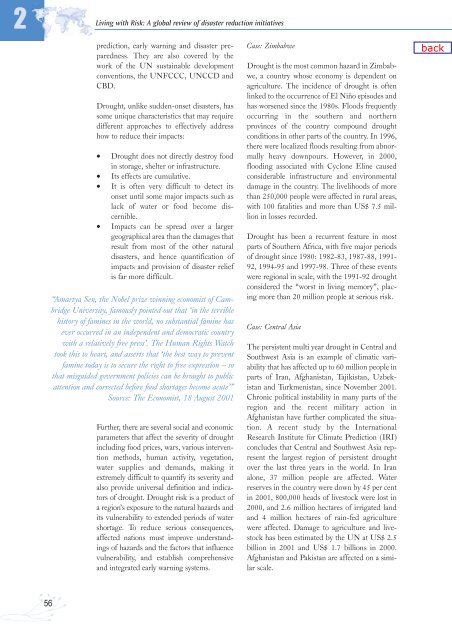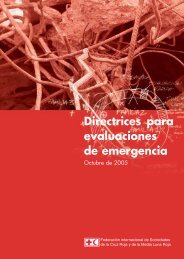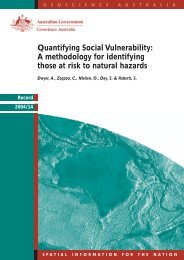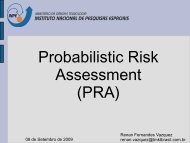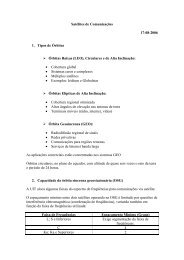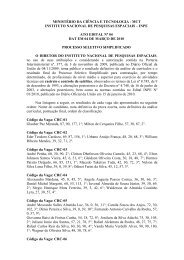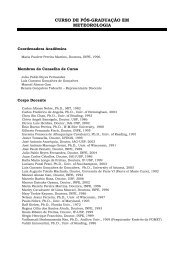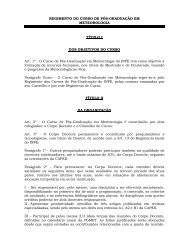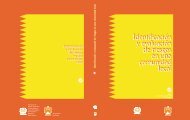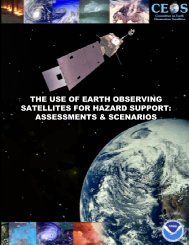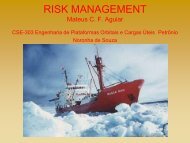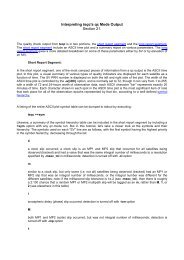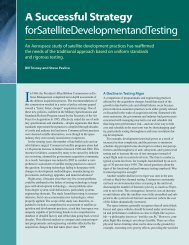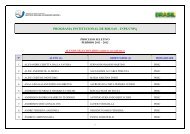Living with Risk. A global review of disaster reduction initiatives
Living with Risk. A global review of disaster reduction initiatives
Living with Risk. A global review of disaster reduction initiatives
Create successful ePaper yourself
Turn your PDF publications into a flip-book with our unique Google optimized e-Paper software.
2<br />
<strong>Living</strong> <strong>with</strong> <strong>Risk</strong>: A <strong>global</strong> <strong>review</strong> <strong>of</strong> <strong>disaster</strong> <strong>reduction</strong> <strong>initiatives</strong><br />
prediction, early warning and <strong>disaster</strong> preparedness.<br />
They are also covered by the<br />
work <strong>of</strong> the UN sustainable development<br />
conventions, the UNFCCC, UNCCD and<br />
CBD.<br />
Drought, unlike sudden-onset <strong>disaster</strong>s, has<br />
some unique characteristics that may require<br />
different approaches to effectively address<br />
how to reduce their impacts:<br />
• Drought does not directly destroy food<br />
in storage, shelter or infrastructure.<br />
• Its effects are cumulative.<br />
• It is <strong>of</strong>ten very difficult to detect its<br />
onset until some major impacts such as<br />
lack <strong>of</strong> water or food become discernible.<br />
• Impacts can be spread over a larger<br />
geographical area than the damages that<br />
result from most <strong>of</strong> the other natural<br />
<strong>disaster</strong>s, and hence quantification <strong>of</strong><br />
impacts and provision <strong>of</strong> <strong>disaster</strong> relief<br />
is far more difficult.<br />
“Amartya Sen, the Nobel prize winning economist <strong>of</strong> Cambridge<br />
University, famously pointed out that ‘in the terrible<br />
history <strong>of</strong> famines in the world, no substantial famine has<br />
ever occurred in an independent and democratic country<br />
<strong>with</strong> a relatively free press’. The Human Rights Watch<br />
took this to heart, and asserts that ‘the best way to prevent<br />
famine today is to secure the right to free expression – so<br />
that misguided government policies can be brought to public<br />
attention and corrected before food shortages become acute’”<br />
Source: The Economist, 18 August 2001<br />
Further, there are several social and economic<br />
parameters that affect the severity <strong>of</strong> drought<br />
including food prices, wars, various intervention<br />
methods, human activity, vegetation,<br />
water supplies and demands, making it<br />
extremely difficult to quantify its severity and<br />
also provide universal definition and indicators<br />
<strong>of</strong> drought. Drought risk is a product <strong>of</strong><br />
a region’s exposure to the natural hazards and<br />
its vulnerability to extended periods <strong>of</strong> water<br />
shortage. To reduce serious consequences,<br />
affected nations must improve understandings<br />
<strong>of</strong> hazards and the factors that influence<br />
vulnerability, and establish comprehensive<br />
and integrated early warning systems.<br />
Case: Zimbabwe<br />
Drought is the most common hazard in Zimbabwe,<br />
a country whose economy is dependent on<br />
agriculture. The incidence <strong>of</strong> drought is <strong>of</strong>ten<br />
linked to the occurrence <strong>of</strong> El Niño episodes and<br />
has worsened since the 1980s. Floods frequently<br />
occurring in the southern and northern<br />
provinces <strong>of</strong> the country compound drought<br />
conditions in other parts <strong>of</strong> the country. In 1996,<br />
there were localized floods resulting from abnormally<br />
heavy downpours. However, in 2000,<br />
flooding associated <strong>with</strong> Cyclone Eline caused<br />
considerable infrastructure and environmental<br />
damage in the country. The livelihoods <strong>of</strong> more<br />
than 250,000 people were affected in rural areas,<br />
<strong>with</strong> 100 fatalities and more than US$ 7.5 million<br />
in losses recorded.<br />
Drought has been a recurrent feature in most<br />
parts <strong>of</strong> Southern Africa, <strong>with</strong> five major periods<br />
<strong>of</strong> drought since 1980: 1982-83, 1987-88, 1991-<br />
92, 1994-95 and 1997-98. Three <strong>of</strong> these events<br />
were regional in scale, <strong>with</strong> the 1991-92 drought<br />
considered the “worst in living memory”, placing<br />
more than 20 million people at serious risk.<br />
Case: Central Asia<br />
The persistent multi year drought in Central and<br />
Southwest Asia is an example <strong>of</strong> climatic variability<br />
that has affected up to 60 million people in<br />
parts <strong>of</strong> Iran, Afghanistan, Tajikistan, Uzbekistan<br />
and Turkmenistan, since November 2001.<br />
Chronic political instability in many parts <strong>of</strong> the<br />
region and the recent military action in<br />
Afghanistan have further complicated the situation.<br />
A recent study by the International<br />
Research Institute for Climate Prediction (IRI)<br />
concludes that Central and Southwest Asia represent<br />
the largest region <strong>of</strong> persistent drought<br />
over the last three years in the world. In Iran<br />
alone, 37 million people are affected. Water<br />
reserves in the country were down by 45 per cent<br />
in 2001, 800,000 heads <strong>of</strong> livestock were lost in<br />
2000, and 2.6 million hectares <strong>of</strong> irrigated land<br />
and 4 million hectares <strong>of</strong> rain-fed agriculture<br />
were affected. Damage to agriculture and livestock<br />
has been estimated by the UN at US$ 2.5<br />
billion in 2001 and US$ 1.7 billions in 2000.<br />
Afghanistan and Pakistan are affected on a similar<br />
scale.<br />
56


